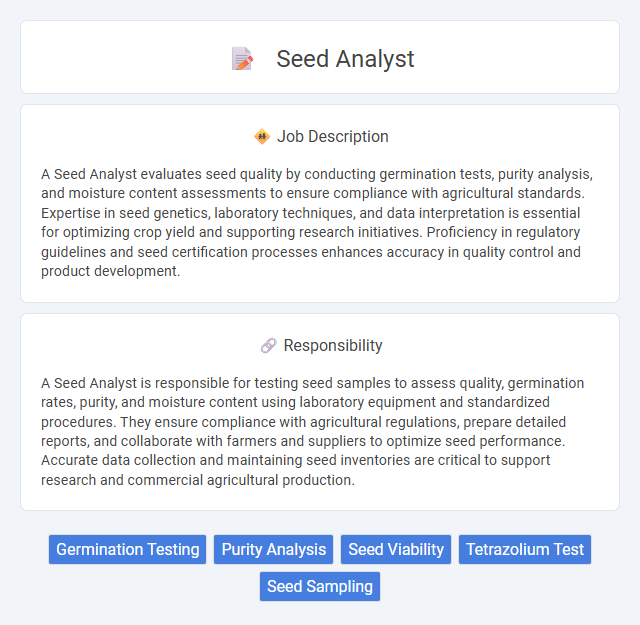
A Seed Analyst evaluates seed quality by conducting germination tests, purity analysis, and moisture content assessments to ensure compliance with agricultural standards. Expertise in seed genetics, laboratory techniques, and data interpretation is essential for optimizing crop yield and supporting research initiatives. Proficiency in regulatory guidelines and seed certification processes enhances accuracy in quality control and product development.
Individuals with strong analytical skills and a keen interest in agriculture will likely find the Seed Analyst role suitable for their talents. Those comfortable working with data and conducting detailed laboratory tests may have a higher probability of succeeding in this position. People who prefer hands-on research and problem-solving in biological sciences are more apt to enjoy and excel in this career.
Qualification
Seed analysts require a strong background in agricultural science, botany, or plant genetics, often holding a bachelor's or master's degree in these fields. Expertise in seed testing methods, such as germination, purity, and vigor assessments, is essential for accurate quality evaluation. Proficiency in laboratory techniques, data analysis software, and understanding of seed certification standards are key qualifications for ensuring seed viability and compliance.
Responsibility
A Seed Analyst is responsible for testing seed samples to assess quality, germination rates, purity, and moisture content using laboratory equipment and standardized procedures. They ensure compliance with agricultural regulations, prepare detailed reports, and collaborate with farmers and suppliers to optimize seed performance. Accurate data collection and maintaining seed inventories are critical to support research and commercial agricultural production.
Benefit
A Seed Analyst job likely offers significant benefits related to career growth in the agricultural and biotechnological sectors. This role probably provides opportunities to work with cutting-edge seed technology and data analysis, leading to enhanced expertise and marketability. Candidates might also experience competitive compensation and benefits, alongside contributing to sustainable agriculture practices.
Challenge
Seed analyst roles likely involve the challenge of accurately predicting seed performance under varying environmental conditions, which can be complex and uncertain. The job probably requires interpreting multifaceted data sets and ensuring regulatory compliance, increasing the difficulty of decision-making. Unpredictable factors such as climate variability may also complicate efforts to deliver reliable insights.
Career Advancement
A seed analyst plays a crucial role in evaluating seed quality through genetic, physical, and purity testing to ensure optimal crop yields. Career advancement in this field often involves progressing to senior analyst positions, quality control management, or research and development roles within agricultural companies. Expertise in laboratory techniques, data interpretation, and regulatory compliance significantly enhances opportunities for leadership and specialized roles in seed technology.
Key Terms
Germination Testing
Seed analysts specialize in conducting germination testing to evaluate seed viability and predict crop yield potential. Using standardized laboratory methods, they assess factors such as seed moisture content, temperature response, and germination rate, ensuring compliance with agricultural quality standards. Accurate germination testing supports farmers and agribusinesses in selecting high-quality seeds for optimal planting outcomes.
Purity Analysis
Seed analysts specializing in purity analysis conduct thorough evaluations to determine the proportion of pure seed versus contaminants, ensuring compliance with agricultural standards and seed certification requirements. They utilize laboratory techniques such as sieving, hand sorting, and flotation tests to identify and quantify foreign matter, inert material, and weed seeds. Accurate purity analysis supports seed quality control, optimizes crop yield potential, and safeguards seed market integrity.
Seed Viability
Seed analysts evaluate seed viability by conducting germination tests and assessing seed health through physical and biochemical methods. They utilize advanced laboratory techniques such as tetrazolium staining and moisture content analysis to determine the potential for successful crop production. Accurate viability assessment ensures quality control and supports agricultural productivity and seed certification processes.
Tetrazolium Test
A Seed Analyst specializing in the Tetrazolium Test evaluates seed viability by applying chemical staining techniques that differentiate living tissue from non-viable tissue. This test is critical for determining seed quality, germination potential, and overall crop productivity by measuring enzymatic activity in seed embryos. Proficiency in interpreting Tetrazolium Test results ensures accurate assessment for agricultural research, seed certification, and quality control processes.
Seed Sampling
Seed sampling involves systematically collecting representative seed samples from batches to ensure quality and genetic purity. Accurate seed sampling is critical for effective germination testing, seed health analysis, and compliance with agricultural standards. Seed analysts employ precise methodologies and tools to maintain sampling integrity, supporting reliable data for seed certification and crop production decisions.
 kuljobs.com
kuljobs.com